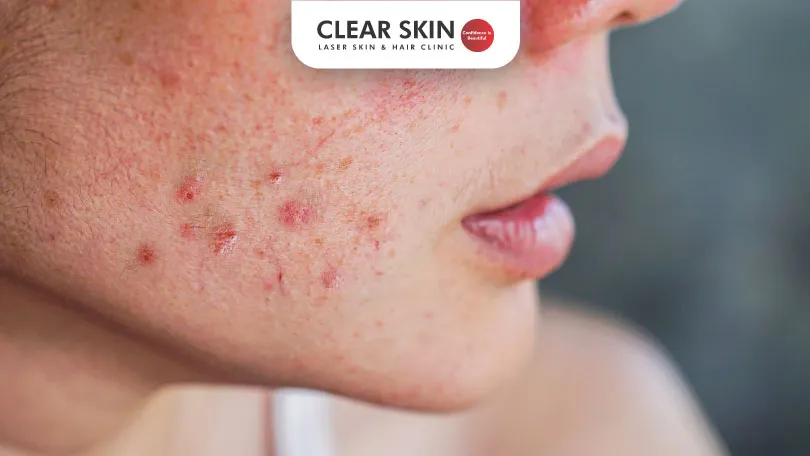Unveiling the Ultimate Skincare Solutions – Dry Skin Acne
Reviewed By: ![]() Dr. Dhananjay Chavan
Dr. Dhananjay Chavan
Updated on: 12th January, 2024

Discover how to combat dry skin acne & achieve radiant skin. Expert skincare tips to hydrate & prevent breakouts.
Do you suffer from dry skin? Do you still get acne? Confused? Yes, dry skin and acne is not a combination that one usually expects, but it can occur together. Read on to know more…
Dry skin is not directly responsible for acne, but it may worsen the symptoms! Many adults and teenagers experience dry skin and acne, both simultaneously.
The good news is that there are skincare routines that will help you fight acne and hydrate the skin simultaneously. To help you understand more about dry skin acne, this post is a brief explanation about the same!
Table Of Content
- What is Dry Skin?
- Why does Acne Occur in Dry Skin Types?
- Care of Dry Skin
- When to Visit a Dermatologist?
- Conclusion
What is Dry Skin? How do you know that you have Oily/ Dry/ Combination Skin?
First things first, you should understand what causes your skin to go dry and how it escalates the chances of getting dry skin acne. When your skin loses too much water quickly, it goes dry! There might be many reasons for this outcome, mostly everyday things.
Some of the reasons include alkaline soaps, harsh and excessive cleansing, scrubs, hot showers, etc. All of these and more cause your skin to lose fats & oils. These fats and oils on the skin are responsible for holding the water molecules as well, and thus stripping the skin of oil strips it of water, too, leaving it dry.
Now, how do you know if your skin is dry, normal or oily?
The answer is here:
The normal skin type has a clear appearance and an even tone. Such skin type doesn’t feel tight or greasy. It should feel supple and soft when you touch it.
- The dry skin type will feel tighter and might get easily irritated. You will find your skin looking flakier and with fine lines.
- The oily skin type will be shinier and might have breakouts. The wrinkles will be less visible, and the skin pores will appear large and dilated.
- The combination skin type might have either oily or normal skin type symptoms around the T-Zone area of the face. T-Zone stands for the part of the face, including your chin, nose, and forehead. Apart from that, you might also experience normal or dry skin around the U-Zone of your face. U-Zone stands for the part of the face, including the eyes, mouth and cheek.
Refer to these descriptions, and you will eventually realise your skin type! For more assistance, you can get in touch with your dermatologist.
Why does Acne Occur in Dry Skin Types?
Dry skin has weak cell-to-cell bonds and thus is responsible for increasing the shedding of dead skin cells. Hence, the rapid increase in dead skin cell buildup can clog the skin pores or hair follicle opening, triggering acne. As a result, dry skin acne is formed!
Apart from that, acne occurs mostly in dry skin types because of the wrong skincare routine, hormonal changes, and some bad habits. Bad habits such as not washing your face before bed, smoking, heavy sugar consumption and others trigger dry skin and acne problems.
Care of Dry Skin
Here are some of the ways that you can adapt to counter dry skin conditions and overcome them:
Prefer using a humidifier during the winter season.
- Limit yourself to just 5 to 10 minutes of bath daily.
- Do not use too many soaps. Instead, you should prefer using gentle moisturizing cleansers as an alternative!
- To prevent the skin from damage, avoid using scrub brushes, bath sponges and washcloths.
- Count on applying a moisturizer immediately after washing your face or bathing. It will assist the skin in plugging the skin cell spaces and seal the moisture. Opt for a non comedogenic moisturiser as it will also reduce the acne issue
- Avoid scratching the skin frequently. Instead, use moisturizer to control the itch and relieve those spots.
When to Visit a Dermatologist?
Do You Know?
Roughly 250 Patients Are Treated
Everyday By These Dermatologists
(You are one click away from flawless skin)
Meet Our Dermatologist!
Conclusion
Further Reading
How to Avoid Acne in Monsoons?
Avoid acne in monsoons with a gentle skincare routine, diet tips, and hydration. Get expert advice to manage breakouts and keep your skin clear and healthy.
Does Makeup Cause Acne-Prone Skin?
Worried about breakouts from using makeup? Does makeup cause acne for you? Learn the safe ways to apply makeup for acne-prone skin.
Morning Skin Care Routine for Glowing Skin
Clear Skin Clinic, led by top dermatologists, shares the ideal morning skincare routine to help you achieve a radiant complexion naturally and effectively.
Monsoon Skin Care Tips for Radiant, Healthy Skin
Clear Skin Clinic, led by top dermatologists, shares the ideal morning skincare routine to help you achieve a radiant complexion naturally and effectively.
Have thoughts? Please let us know
We are committed not only to treating you, but also educating you.





